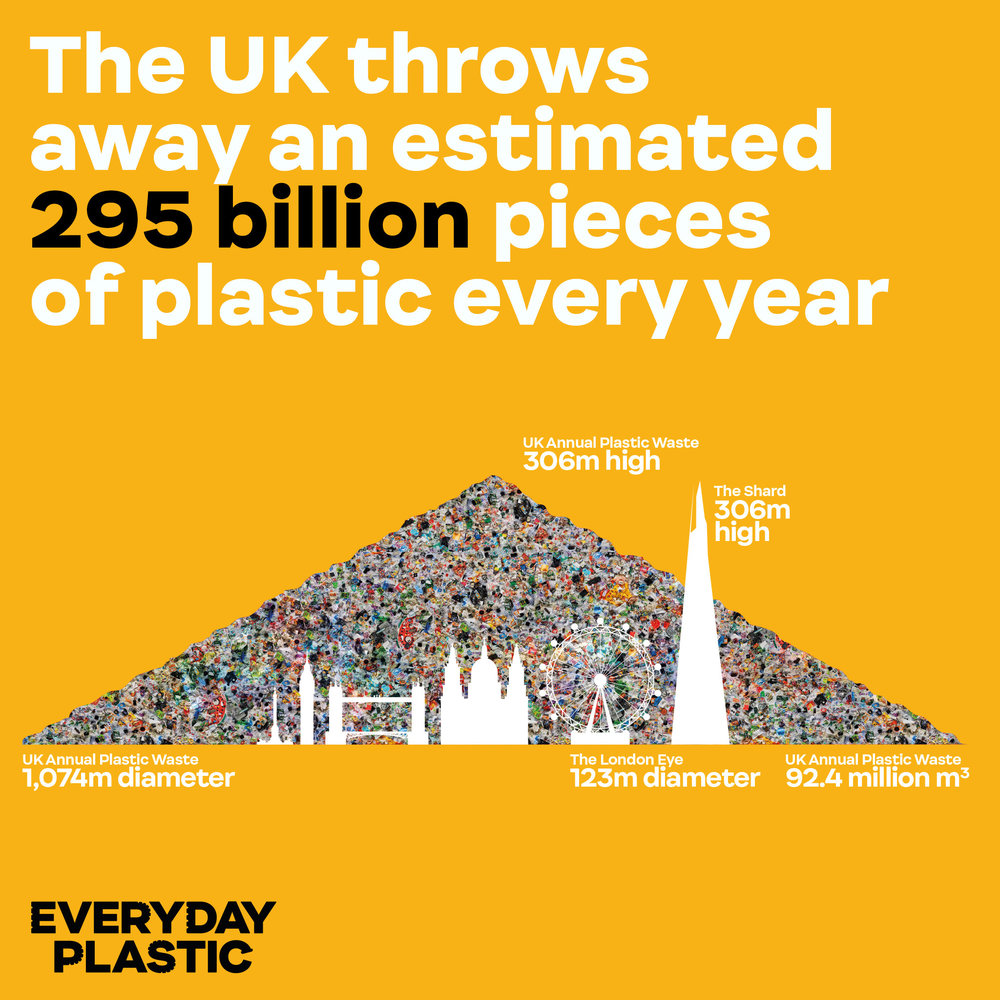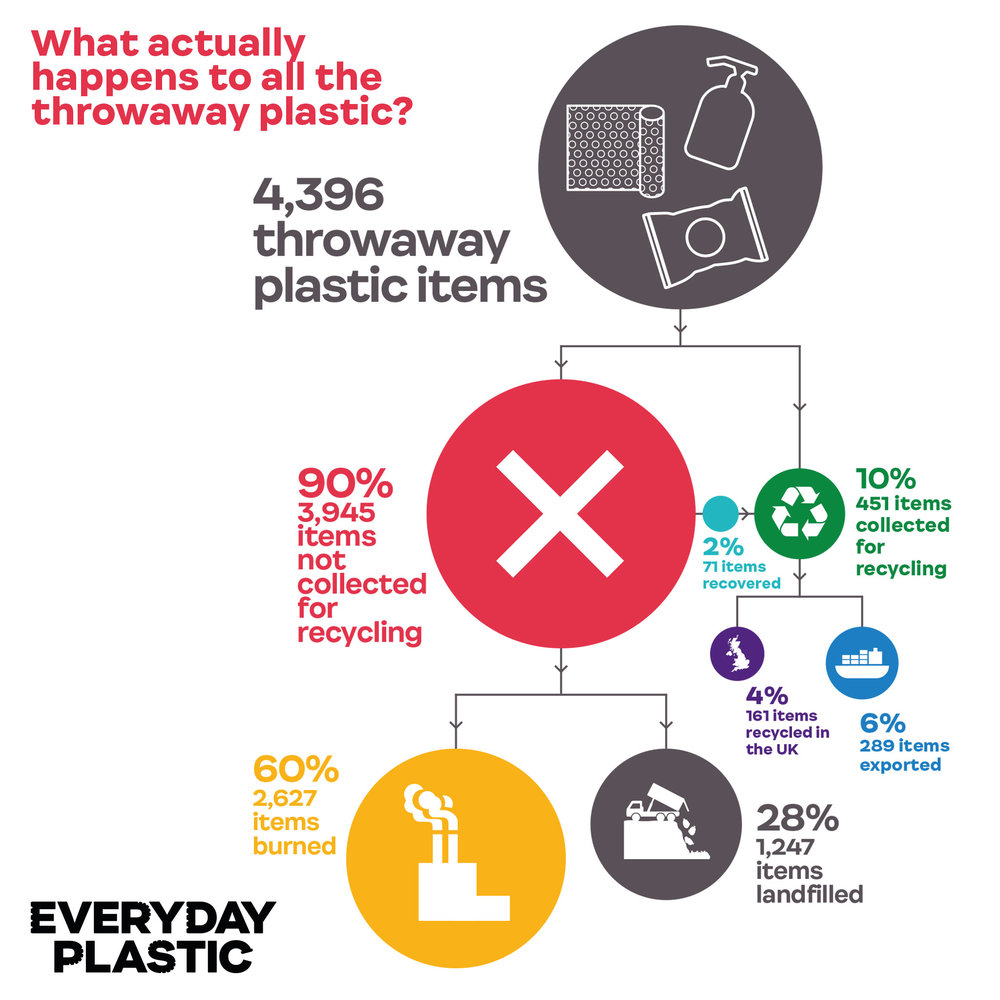Everyday Plastic: what we throw away and where it goes
A new report endorsed by Surfers Against Sewage estimates that the UK population throws away over 295 BILLION pieces of plastic every year.
- Piled together, this would create a mountain of plastic as high as The Shard in London with a base over a kilometre in diameter.
- The report by the Everyday Plastic project reveals that just 4% of the author’s annual plastic waste would actually be recycled in the UK.
- It leads the report’s authors to ask: “Are we being lied to about recycling? Because clearly, recycling is not enough.”
- Read the full report here: https://www.everydayplastic.org/
In a unique personal experiment, Daniel Webb decided to store all the plastic waste he threw in the bin for 12 months. Shortly after moving to Margate on the Kent coast in 2016, he quickly learned that he was not provided with a recycling service at his flat. Motivated by plastic pollution and wanting to dig deeper into murky national recycling figures, he launched a personal investigation to understand exactly what he throws away and where it ends up. His hoard of plastic waste over a year totalled 4,490 individual pieces of plastic, which turns out to be slightly below the average UK citizen.
This new report ‘Everyday Plastic: what we throw away and where it goes ‘ rigorously examines Webb’s annual consumption of plastic. It uncovers a wide range of brand new statistics, from the amount of food packaging used in a year to how much of Webb’s plastic waste is exported to other countries.
One of the key aims was to authentically calculate the recyclability of his plastic waste. Daniel Webb said: “Recycling is our way of doing good, right? While recycling allows us to obliviously get rid of our plastic waste, it far from gets rid of the problem. Illustrated by the fact that only 4% of my plastic waste would actually be recycled, it outs plastic recycling in the UK as a poorly funded system that needs significant investment and improvement. There is a major gap between our expectations and reality. Essentially, we not are being told the truth about recycling”.
Key findings include:
- Over the course of one year, Daniel threw away 4,490 pieces of plastic
- The UK throws away over 295 billion pieces of plastic every year
- 93% of his collected plastic waste was single-use packaging
- 67% of Webb’s throwaway plastic was used to package, wrap and consume food
- 70% of the plastic that Daniel threw away in a year is not currently recyclable
- Only 4% of Webb’s collection of plastic waste would be recycled at UK recycling facilities
Webb’s experiment caught the attention of earth scientist, Dr Julie Schneider, who catalogued, analysed and weighed his collection of plastic, comparing results to publicly available data. Dr Julie Schneider said: “Daniel’s project was a unique opportunity to finally replace vague assumptions with concrete numbers. For instance, we wanted to know how much of our everyday plastic waste is actually recyclable. Plastic bottles can be properly recycled, but what about the plastic film that wraps our vegetables, pasta and sweets? All the plastic packaging stamped with the ‘not currently recycled’ logo? It turns out that 70% of Daniel’s plastic waste is not currently recyclable! This is an issue that needs to be addressed urgently.”
Webb and Schneider’s report follows separate research by the National Audit Office that earlier in the year revealed stark statistics about the reliance on export in the plastic recycling in the UK. It also follows news reports last week that revealed fraud and exploitation in the recycling industry.
Dr Julie Schneider said: “I wish everybody could have seen the room where we unpacked one year’s worth of Daniel’s plastic waste. In a massive warehouse in Margate, the floor was completely covered with thousands of plastic pots, trays, bags, films, lids and other everyday items. Everyone that entered the room had the same reaction: ‘Wow, that’s just one person’s plastic waste’. ”
Webb says that “This has been a very personal and exploratory journey and it’s amazing how my mindset and grasp of the issue has changed. We can’t just rely on recycling to fix plastic pollution. Most importantly, we need to produce and use much less plastic. Our fast-moving disposable society means that we are using more single-use things than ever, so we need to rethink how we consume.”
The report has been released with the support of Surfers Against Sewage, the UK’s leading plastic pollution charity, and designed by agency Leap as part of their people and planet ‘design for change’ initiative. Hugo Tagholm, CEO at Surfers Against Sewage said “The Everyday Plastic report not only exposes the sheer diversity and volume of single-use plastic we all have to navigate daily, but as alarmingly, the inadequacy of current recycling systems, which only return a paltry amount of material back to shop shelves. Reducing the use of pointless plastics is a priority – there is just too much plastic currently being made. Then, all plastics that remain should be fully accounted for, captured and reprocessed by manufacturers. The future health of people and planet depend on drastically curbing plastic emissions.”
With such a sizable inventory of plastic waste, Webb said that “if I’d have given up plastic bottles, coffee cups, straws, stirrers, cutlery, carrier bags and swapped shower gel for soap, I would’ve thrown away 316 fewer items in 2017. If only half the UK population did the same thing, we could prevent 10 billion pieces from entering the waste system. So don’t ever let anyone tell you that individuals can’t make a difference!”
For interviews or more information, please contact: Daniel Webb — Founder, Everyday Plastic — +44 7968 532663 — dan@everydayplastic.org
Everyday Plastic Instagram: @everydayplastic — Twitter: @PlasticEveryday — Web: everydayplastic.org Leap Instagram: @leapness — Twitter: @leapness — Web: leap.eco
NOTES TO EDITORS
Everyday Plastic Everyday Plastic is an art and educational project that aims to communicate the realities of our plastic consumption in a personal and relatable way. Daniel Webb collected every piece of plastic he used in 2017. Having counted, categorised, weighed and photographed the whole collection of plastic waste, he turned it into a large-scale billboard, shown at Dreamland, Margate in early 2018. The project received global media coverage including features in The Guardian, National Geographic, Metro, Sky News, BBC and more.
Daniel Webb Daniel has worked in marketing for 10 years. He has had a more active interest in conservation since 2015, leading him to launch Everyday Plastic in 2017. Daniel delivers talks to schools, businesses and events and works with major environmental charities such as Greenpeace, Friends of the Earth and Surfers Against Sewage.
Dr Julie Schneider Julie has a PhD in earth sciences with a speciality in geochemistry and was a lecturer and researcher at the Université Nice-Sophia Antipolis in France for eight years. Since moving to the UK, she volunteered with Friends of the Earth before starting working with CHEM Trust – a charity that works to prevent man-made chemicals from causing long term damage to wildlife and humans.
Leap is an eco-design studio housing a hub of talented creatives and associates who use their specialised skills in design, branding and web as tools for positive change for people, planet and profit. As well as changing the world through design, Leap takes pride in a carbon-neutral hosting service created with care to green up the web one website at a time. Visit for more information
Footnotes 1 All percentages are given relatively to the number of pieces. Data based on weight are available in the Annex 2 of the report at this link: everydayplastic.org/report-appendix 2 National Audit Office, 23 July 2018. The packaging recycling obligations.


